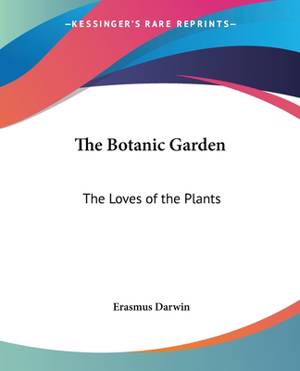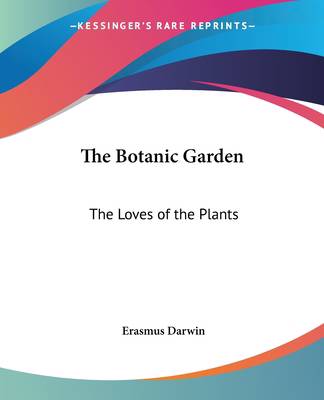
- Retrait gratuit dans votre magasin Club
- 7.000.000 titres dans notre catalogue
- Payer en toute sécurité
- Toujours un magasin près de chez vous
- Retrait gratuit dans votre magasin Club
- 7.000.0000 titres dans notre catalogue
- Payer en toute sécurité
- Toujours un magasin près de chez vous
32,45 €
+ 64 points
Format
Description
The Botanic Garden: The Loves of the Plants is a poem written by Erasmus Darwin, the grandfather of Charles Darwin. The poem was first published in two parts in 1789 and 1791, and it explores the world of botany through a series of romantic and mythological stories. The poem is divided into two parts: The Economy of Vegetation and The Loves of the Plants. The first part focuses on the scientific aspects of botany, while the second part is more focused on the romantic and mythological stories of the plants. Throughout the poem, Darwin personifies plants and gives them human-like qualities. He tells stories of their relationships and interactions with each other, as well as their roles in the natural world. The Botanic Garden was a popular work in its time and was praised for its scientific accuracy and its poetic beauty. It is considered a significant contribution to the field of botany and is still studied and admired today.This scarce antiquarian book is a facsimile reprint of the old original and may contain some imperfections such as library marks and notations. Because we believe this work is culturally important, we have made it available as part of our commitment for protecting, preserving, and promoting the world's literature in affordable, high quality, modern editions, that are true to their original work.
Spécifications
Parties prenantes
- Auteur(s) :
- Editeur:
Contenu
- Nombre de pages :
- 160
- Langue:
- Anglais
Caractéristiques
- EAN:
- 9781419154904
- Date de parution :
- 17-06-04
- Format:
- Livre broché
- Format numérique:
- Trade paperback (VS)
- Dimensions :
- 192 mm x 234 mm
- Poids :
- 294 g

Les avis
Nous publions uniquement les avis qui respectent les conditions requises. Consultez nos conditions pour les avis.






